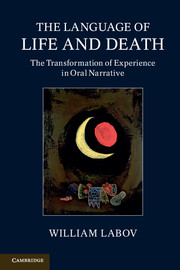Book contents
- Frontmatter
- Contents
- Preface
- Acknowledgments
- 1 Introduction to the language of life and death
- 2 Narrative analysis
- 3 The escalation of violence
- 4 Confrontations with death
- 5 Premonitions and communication with the dead
- 6 Margie Knott: “Her confrontation with the neighbors”
- 7 Gloria Stein: “They stoned the house”
- 8 Rose Norman: “The death of her younger sister”
- 9 Mary Costa: “The death of her youngest daughter”
- 10 Cache County
- 11 The vernacular origin of epic style
- 12 Historians' use of narrative
- 13 Thomas Babington Macaulay: “The death of Monmouth”
- 14 S. T. Bindoff: “The death of Elizabeth”
- 15 2 Samuel: “The death of Absalom”
- 16 The narrative view of death and life
- References
- Index
1 - Introduction to the language of life and death
Published online by Cambridge University Press: 05 June 2013
- Frontmatter
- Contents
- Preface
- Acknowledgments
- 1 Introduction to the language of life and death
- 2 Narrative analysis
- 3 The escalation of violence
- 4 Confrontations with death
- 5 Premonitions and communication with the dead
- 6 Margie Knott: “Her confrontation with the neighbors”
- 7 Gloria Stein: “They stoned the house”
- 8 Rose Norman: “The death of her younger sister”
- 9 Mary Costa: “The death of her youngest daughter”
- 10 Cache County
- 11 The vernacular origin of epic style
- 12 Historians' use of narrative
- 13 Thomas Babington Macaulay: “The death of Monmouth”
- 14 S. T. Bindoff: “The death of Elizabeth”
- 15 2 Samuel: “The death of Absalom”
- 16 The narrative view of death and life
- References
- Index
Summary
In the late afternoon of July 29, 1963, I was talking to a retired Jewish postman named Jacob Schissel, in his brownstone house on New York City's Lower East Side. I had reached the point in the interview that dealt with serious matters, and I asked, “Were you ever in a situation where you thought you were in serious danger of being killed? Did that ever happen to you?” Schissel answered “Eh no, at no time” but then added, “Wait a second, let me contradict myself. Yes, once.” I said, “What happened?” and Schissel said, “My brother put a knife in my head.” I said, “How'd that happen?” and Schissel then told me the story.
This was just a few days after my father had died
and we were sitting shiva.
And the reason the fight started,
he saw a rat out in the yard
– this was out in Coney Island –
and he started talk about it.
And my mother had just sat down to have a cup of coffee
and I told him to cut it out.
'Course kids, y'know, he don't hafta listen to me.
So that's when I grabbed his arm
and twisted it up behind him.
When I let go his arm,
there was a knife on the table,
he just picked it up
and he let me have it.
And . . .; I started bleeding – like a pig.
And naturally first thing to do, run to the doctor,
and the doctor just says, “Just about this much more,”
he says, “and you'd a been dead.”
As I was leaving, going down the stairs, I heard Mrs. Schissel say, “That's a clever young man.” I remember being puzzled. I didn't do anything clever, I thought to myself. But something important must have happened on that Monday afternoon.
- Type
- Chapter
- Information
- The Language of Life and DeathThe Transformation of Experience in Oral Narrative, pp. 1 - 13Publisher: Cambridge University PressPrint publication year: 2013



